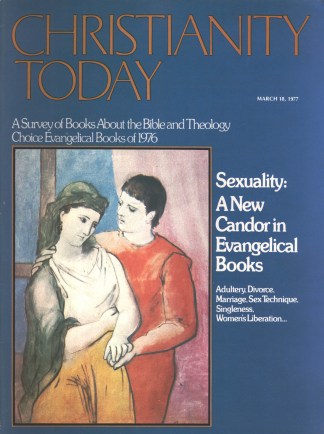In the Church’s task of evangelizing the world, India has a role of extreme significance. Its population of over 630 million is greater than the combined population of all the countries of Africa and Latin America. It has more people yet to be reached with the Gospel than all the rest of Asia, Red China excluded. One of the most exciting aspects of contemporary mission, therefore, is that the door is still open for the proclamation of the Gospel in this vast land. India’s constitution provides one the freedom to “profess, practice and propagate” the religion of one’s choice.
At a congress held at Devlali January 12–19 (see News, March 4 issue, page 49) more than 400 evangelical leaders of India grappled with various issues and challenges. One of their main purposes was to reaffirm the truth and absolute validity of the Gospel of Christ and its full relevance to their ministry in India. The congress made a breakthrough in that evangelicals in India have begun to take more seriously their “context” or life situation in society as related to their mission. This was reflected in the main problems studied. The statement that the congress produced, called “The Devlali Letter,” spoke clearly on several key issues. We might note two examples:
First, the Gospel and India’s culture. In India, as in many other Third World countries, the political and cultural expansion of Western powers and the Christian missions have, in the thinking of many people, been two sides of the same movement. Regrettably, Western culture and Christianity are closely associated in the thinking and life-style of many Christians in India. This has been a stumbling block to Christian witness.
The congress considered whether the Gospel can be presented and lived in India in such a way that Christ can meet and enter into fellowship with an Indian just where he is and just as he is. Can one who accepts Christ be quite at home in his own social and cultural environment?
According to the Devlali Letter, “The Church must be true to Christ and at the same time rooted in the soil. While belonging to Christ, it should belong to and be relevant to its socio-cultural context. There are various cultural and indigenous values which the Church in India can effectively make use of in its life, worship and witness, instead of uncritically using elements from foreign cultures.”
There is an increasing concern among evangelicals in India for indigenization of thought patterns, way of life, modes of worship, and methods of evangelization. What does this mean to the question of the moratorium on missionaries? The letter said, “Servants of Christ who have come to India from abroad have had a significant role to play. We continue to maintain a partnership with them in the work before us.”
Second, evangelism and Christian social responsibility. In a country such as India where a great segment of the population lives in poverty, hunger, and ill health, the relation of evangelism and social responsibility is a very live question. It is India, too, that produced some of the influential proponents of the theory of salvation as humanization, or evangelism as social action. The term “evangelism” itself is often wrongly interpreted in the broad sense, to include the total mission of the Church, in which socio-political action plays a primary role. The letter therefore affirmed, “To identify salvation entirely with the social and economic well-being of man is to present an incomplete and distorted view. This will lead to a false concept of evangelism and to an abandonment of proclaiming the Gospel with a view to personal commitment to Christ.”
The Christian who is commanded to love his neighbor as himself finds all around him in India living examples of Christ’s explanation of who is one’s “neighbor.” Christian love should be genuine and stand on its own feet without any ulterior motives. Social concern cannot be used as a bait or bribe to get people evangelized. It need not necessarily lead to evangelism. On the other hand, our proclamation need not in each case be manifested in social service. But evangelism occupies a central place in the total mission of the Church.
Only in a given situation, in the context of genuine love for others and full obedience to Christ, can we determine whether evangelism or social responsibility takes priority in that situation. Evangelism is the verbal expression, and social action the visible expression, of God’s love, and we cannot separate the two.
Basic to this conviction is our concept of God as Creator and Judge of all men and our understanding of man as created in God’s image. As the Delali Letter says, “This means that we cannot separate body and soul or individuals and society, in our concern. Thus evangelism and our concern for man and society should go hand in hand. Both are part of the mission God has given us and are the expressions of genuine love for others.”
The congress went a step further to affirm the prophetic ministry of the Church and the need for it to be a sign of God’s kingdom serving as the conscience of society. “We are to stand against falsehood. evil, and injustice at the personal, the social and the institutional levels in fearless obedience to Christ.”
It has been said that evangelicals have not until recently taken the world and their social responsibility seriously, and that at the Lausanne Congress a breakthrough in this was made (in, for example, clause five of the Lausanne Covenant). But is this assessment really valid? For leaders such as Luther, Calvin, and Wesley, their evangelical theology was instrumental in bringing about radical social changes even on a national scale. Many of the most significant social-service and development programs in the Third World, until recently, were initiated and sponsored by conservative evangelical missions. And these were far from sporadic acts of mercy.
But two qualifications may be made. The evangelicals, unlike their critics, have not seriously spoken to the issue of oppressive structures in society, nor have they discussed the questions of the use of force and the Church’s involvement in liberation movements. One cannot separate the question of social renewal and that of sin and rebellion against God at the level of institutions and structures.
It may be that we should also ask ourselves to what extent our social concern springs from and is closely linked with our doctrine of creation and the doctrine of man. Evangelicals need to do more study in this area of developing an integrated theology of God’s love and concern for the total man.
Saphir P. Athyal is the principal of Union Biblical Seminary, Yeotmal, India. This is his first contribution to Current Religious Thought.










